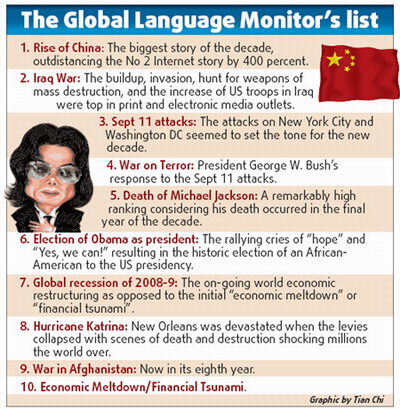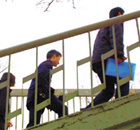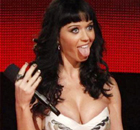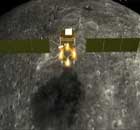Society
Rise of the dragon decade's most read news
By Zhang Jin (China Daily)
Updated: 2009-12-09 07:46
A US media tracker has listed "the rise of China" as the most read news story of this decade, a development that Chinese experts say is the latest attempt by the Western media to tout China for their own good.

The ascent of China as an economic superpower has attracted the widest coverage since 2000, surpassing the Iraq War and Sept 11 attack on the US, according to an analysis by the Global Language Monitor.
"It is with little surprise that its (China's) ongoing transformation has topped all other news stories in a decade bespotted by war, economic catastrophe and natural disasters," Reuters quoted Paul JJ Payack, president of the Global Language Monitor, as having said.
Payack said the ranking was based on the number of citations on the Internet and the blogosphere, including social media, as well as the top 50,000 print and electronic media sites.
But Pang Zhongying, a professor of international studies at Beijing-based Renmin University of China, said the move was partly aimed at trumpeting the so-called China threat.
"The list is the latest sign of the US media's change from China bashing to China flattery," he said.
| ||||
Although the moves show the US media has come to accept China's economic success, they put China in a disadvantageous position, said Fan Ying, a professor at Beijing-based China Foreign Affairs University.
The recent rise in the level of "China flattery" appears to push the world's third largest economy - but which has 16 million poor people - to shoulder greater responsibility amid the global financial crisis and climate change talks, she said.
"The West is now keen to picture China as an economic giant so that it could ask Beijing to do a lot more than it has committed, such as rolling out a fresh stimulus package, revaluating its currency, reducing its greenhouse gas (GHG) emissions further and continuing to buy US bonds," she said.
China is one of the very few major economies that has kept growing during the global economic recession, prompting the West to urge it to pull the world out of the worst economic crisis in seven decades.
Many countries, including large historic GHG emitters, have urged China to commit to deeper emission cuts in the run-up to the Copenhagen climate conference, where 192 countries and regions are discussing a new deal to succeed the Kyoto Protocol.
The US media hype on China's growth could fan the worries of some Americans, said Wang Yizhou, a researcher on world economic and political studies with the Chinese Academy of Social Sciences.
US President Barack Obama said during his maiden visit to Asia last month that Washington doesn't seek to contain Beijing. But "many US people still think a strong China poses a threat, in particular, when China grows", Wang said.
A survey expert said yesterday the Global Language Monitor analysis signals the concern of Westerners, Americans in particular.
"The rise of China is a trend that has evolved and will keep evolving for a long time," Yuan Yue, president of Horizon Research Consultancy, said. "The ranking shows China's rise has tinkled the nerves of the West."
The Global Language Monitor was not available for comment.
Peng Kuang contributed to the story









